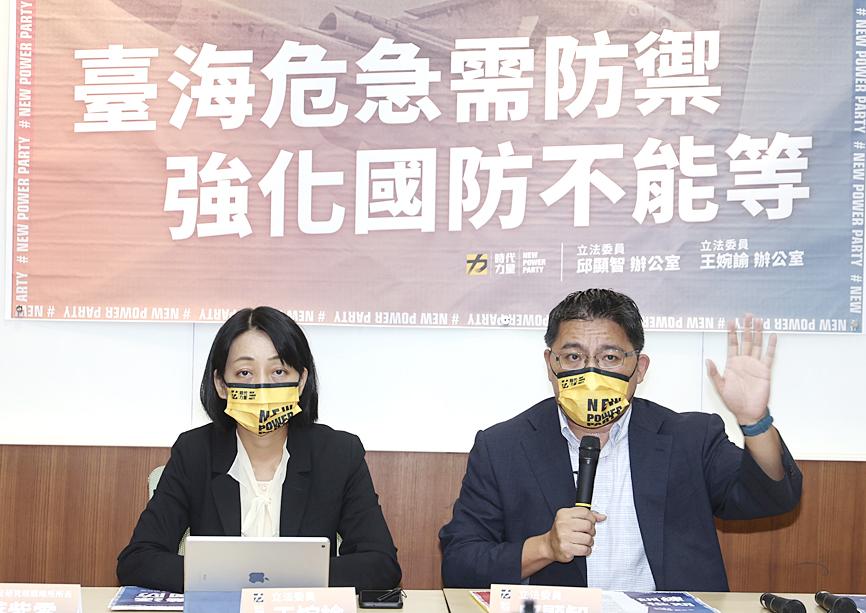Taiwan is “racing against the clock” to reform its defenses, New Power Party (NPP) legislators and experts said yesterday, cautioning against politicizing the issue.
“Defense reform cannot wait any longer,” NPP caucus whip Chiu Hsien-chih (邱顯智) told a news conference in Taipei.
Short, medium and long-term goals are needed, along with better public communication, Chiu said.

Photo: CNA
The indigenous shipbuilding program cannot keep facing delays, as Taiwan’s aging warships cannot compete with China’s ships, which are only a decade old on average, he said.
Volunteer soldier training must also be improved, especially as China steps up its military intimidation, he added, criticizing reports of army privates being ordered to practice songs rather than train.
“Our soldiers’ time is precious,” Chiu said.
Su Tzu-yun (蘇紫雲), a research fellow at the Institute for National Defense and Security Research, agreed about the nation’s outdated warships, saying the budget should be increased.
Taiwan’s new-generation ships would be 6,000-tonne vessels propelled by a combination of gas and diesel engines, better capable of countering China’s gray-zone tactics, Su said.
The war in Ukraine and China’s recent drills show that warfare is no longer limited to traditional armed conflict, but also involves psychological, economic and other types of warfare, NPP Legislator Claire Wang (王婉諭) said.
Pro-China parties in Taiwan are also fostering a sense of defeatism, she said, adding that the Chinese Nationalist Party (KMT) has even sent its vice chairman to China, leaving Taiwanese confused.
The Ministry of National Defense should be more active than it has been and share as much as it can with the public, she said, recommending regular news conferences and public announcements of Chinese maneuvers, as well as timely reactions to public concerns.
These could pre-empt misinformation from China and ensure that Taiwanese do not rely on other countries to learn about what is happening at home, she added.
Former minister of national defense Michael Tsai (蔡明憲) called on politicians to extend conscription to one year as soon as possible, instead of waiting until after local elections later this year, as the nation is “racing against the clock” to bolster its defenses.
“Taiwan’s security cannot be subject to electoral or political considerations,” he said.
He also urged President Tsai Ing-wen (蔡英文) to hold a news conference detailing Taiwan’s “bottom line” for the global community.
As missiles flying overhead could mistakenly fall on Taiwanese territory, the president must clarify the nation’s stance, or other nations could doubt that the government has a strategy, he added.

Taiwan has received more than US$70 million in royalties as of the end of last year from developing the F-16V jet as countries worldwide purchase or upgrade to this popular model, government and military officials said on Saturday. Taiwan funded the development of the F-16V jet and ended up the sole investor as other countries withdrew from the program. Now the F-16V is increasingly popular and countries must pay Taiwan a percentage in royalties when they purchase new F-16V aircraft or upgrade older F-16 models. The next five years are expected to be the peak for these royalties, with Taiwan potentially earning

STAY IN YOUR LANE: As the US and Israel attack Iran, the ministry has warned China not to overstep by including Taiwanese citizens in its evacuation orders The Ministry of Foreign Affairs (MOFA) yesterday rebuked a statement by China’s embassy in Israel that it would evacuate Taiwanese holders of Chinese travel documents from Israel amid the latter’s escalating conflict with Iran. Tensions have risen across the Middle East in the wake of US and Israeli airstrikes on Iran beginning Saturday. China subsequently issued an evacuation notice for its citizens. In a news release, the Chinese embassy in Israel said holders of “Taiwan compatriot permits (台胞證)” issued to Taiwanese nationals by Chinese authorities for travel to China — could register for evacuation to Egypt. In Taipei, the ministry yesterday said Taiwan

Taiwan is awaiting official notification from the US regarding the status of the Agreement on Reciprocal Trade (ART) after the US Supreme Court ruled US President Donald Trump's global tariffs unconstitutional. Speaking to reporters before a legislative hearing today, Premier Cho Jung-tai (卓榮泰) said that Taiwan's negotiation team remains focused on ensuring that the bilateral trade deal remains intact despite the legal challenge to Trump's tariff policy. "The US has pledged to notify its trade partners once the subsequent administrative and legal processes are finalized, and that certainly includes Taiwan," Cho said when asked about opposition parties’ doubts that the ART was

If China chose to invade Taiwan tomorrow, it would only have to sever three undersea fiber-optic cable clusters to cause a data blackout, Jason Hsu (許毓仁), a senior fellow at the Hudson Institute and former Chinese Nationalist Party (KMT) legislator, told a US security panel yesterday. In a Taiwan contingency, cable disruption would be one of the earliest preinvasion actions and the signal that escalation had begun, he said, adding that Taiwan’s current cable repair capabilities are insufficient. The US-China Economic and Security Review Commission (USCC) yesterday held a hearing on US-China Competition Under the Sea, with Hsu speaking on